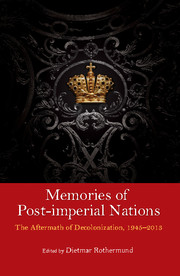Book contents
- Frontmatter
- Contents
- Preface
- Introduction
- 1 Memory of Empire in Britain: A Preliminary View
- 2 Ruptures and Dissonance: Post-colonial Migrations and the Remembrance of Colonialism in the Netherlands
- 3 A Distinctive Ugliness: Colonial Memory in Belgium
- 4 The Post-colonial Encounter in France
- 5 Ideologies of Exceptionality and the Legacies of Empire in Portugal
- 6 Post-colonial Italy: The Case of a Small and Belated Empire: From Strong Emotions to Bigger Problems
- 7 Post-imperial Japan in Transnational Perspective
- 8 Memories of Post-imperial Nations
- 9 A View from the Gallery: Perspective of a ‘Colonized’ on Post-imperial Memories
- Contributors
- Index
4 - The Post-colonial Encounter in France
Published online by Cambridge University Press: 05 September 2015
- Frontmatter
- Contents
- Preface
- Introduction
- 1 Memory of Empire in Britain: A Preliminary View
- 2 Ruptures and Dissonance: Post-colonial Migrations and the Remembrance of Colonialism in the Netherlands
- 3 A Distinctive Ugliness: Colonial Memory in Belgium
- 4 The Post-colonial Encounter in France
- 5 Ideologies of Exceptionality and the Legacies of Empire in Portugal
- 6 Post-colonial Italy: The Case of a Small and Belated Empire: From Strong Emotions to Bigger Problems
- 7 Post-imperial Japan in Transnational Perspective
- 8 Memories of Post-imperial Nations
- 9 A View from the Gallery: Perspective of a ‘Colonized’ on Post-imperial Memories
- Contributors
- Index
Summary
More than half a century ago, Georges Balandier (1951) defined the ‘colonial situation’ while the empires of European nations crumbled. He described colonial rule as a domination imposed by a foreign minority in the name of cultural superiority on a majority of natives who were in a situation of material inferiority. This notion of the ‘colonial situation’ made it possible to discuss the dynamics of social transformation in a ‘colonial encounter’. Such a discussion was necessary when the colonies and their populations represented nearly one third of the territory and of the people of the world and when these people were regarded as societies with a ‘static history’ (Levi-Strauss, 1961). The physical occupation of conquered territories enabled the colonial rulers to acquire anthropological knowledge based on participant observation. This method was first adopted in the Trobriand Islands by scholars of the British Anthropological Institute directed by Bronislav Malinovski. He initiated this new approach in order to overcome the kind of ethnographical analysis based on the reports of others who had not really mastered the methods of investigation (Céfai, 2003). Even though the new methods were largely adopted in a colonial context, they helped to overcome the ethno-centrisms and habits of thought introduced in colonial areas by travellers, missionaries and European administrators (Copans, 1974). The ending of empires and their newfound independence then enabled the people of the former colonies to make use of their new freedom of speech and to enter the field of post-colonial studies. This field is characterized by a multiplicity of disciplines with their different approaches to this subject. A conceptual clarification is required because the very term ‘post-colonial’ can refer to an area of research, a historical period or a specific category of analysis. This can give rise to a veritable academic carnival (Bayart, 2010). Without adequate clarification ‘post-colonialism’ would just provide a screen, shielding a welter of confusing assertions.
- Type
- Chapter
- Information
- Memories of Post-Imperial NationsThe Aftermath of Decolonization, 1945–2013, pp. 76 - 96Publisher: Cambridge University PressPrint publication year: 2015
- 2
- Cited by



